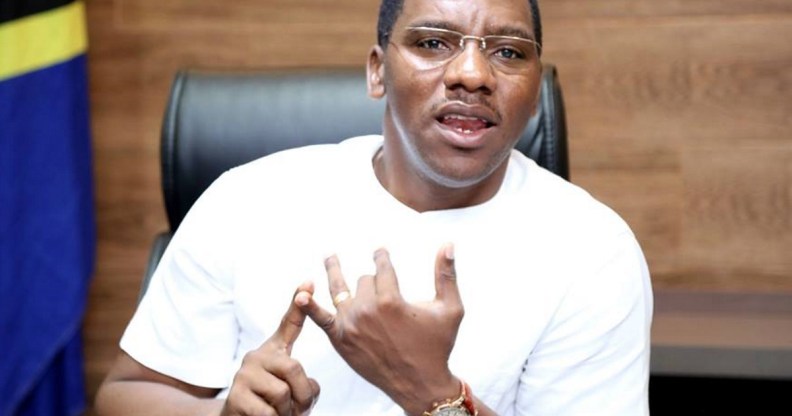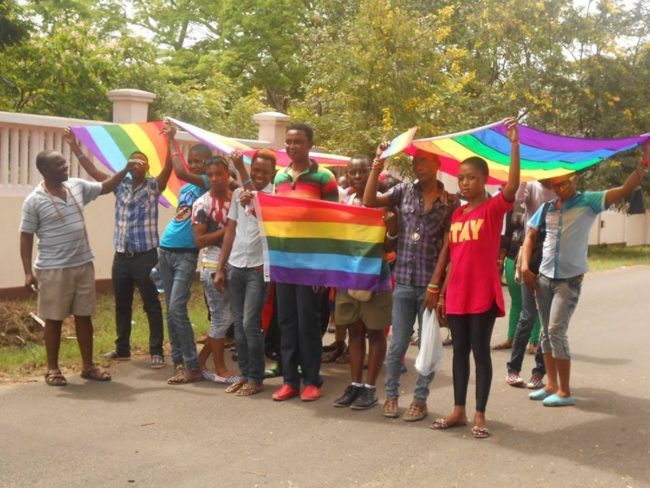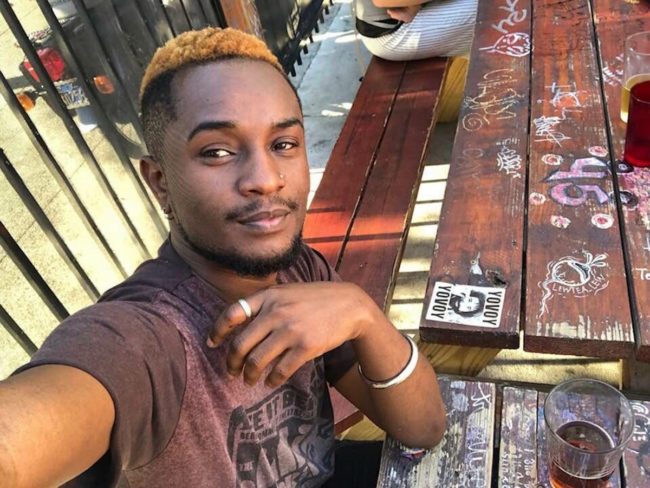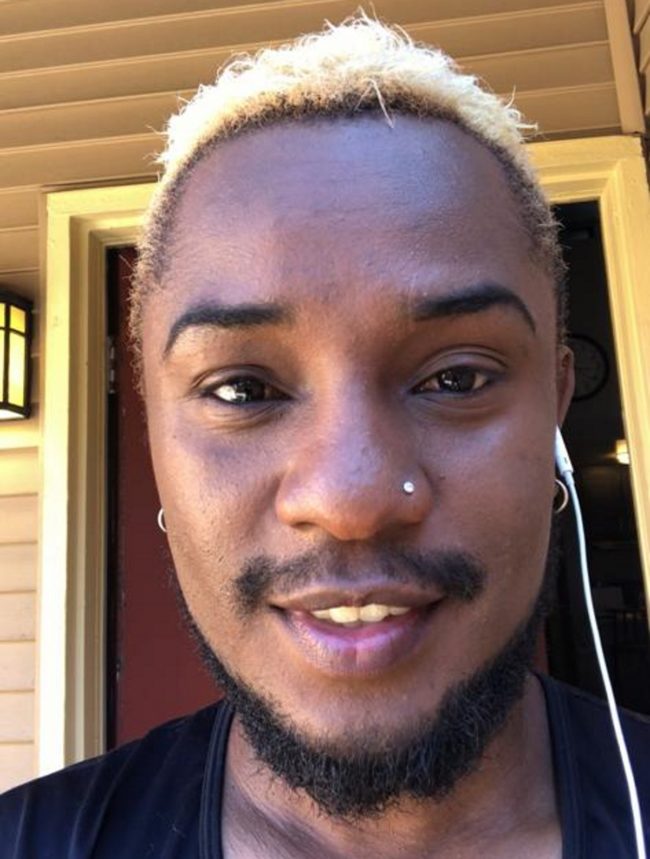Gay Tanzanians living in fear as governor launches witch-hunt

Makonda has been Dar es Salaam’s governor since 2016. (paul makonda/facebook)
Gay people in Tanzania are terrified for their safety following Dar es Salaam governor Paul Makonda’s creation of a team to hunt them down.
Experts and activists living in the city—the country’s former capital, whose governor announced on Wednesday that he wanted to turn into “a non-gay city”—have told PinkNews they expect the queer community to be targeted with anal testing, forced convictions and “a high level of brutal violence and harassment.”
Queer people in Tanzania also face up to life imprisonment if they are convicted of having gay sex.
Thousands of messages have already been sent to the task force of 17 people, which Makonda said included doctors who would “assess all those who will be named,” adding that “some gays are known because they walk in Pampers and offer a very fragrant odour.”
A gay man and LGBT+ activist who works in Dar es Salaam and did not want to be named warned that Makonda’s declarations should be taken literally, not just as inflammatory rhetoric.
“It is expected the arrests are going to happen,” he said, “since the police in Tanzania don’t follow the law anymore, but instead follow what politicians like Makonda say.”

Tanzania was a refuge for LGBT+ people until the last couple of years (lgbt voice tanzania/facebook)
“They don’t care even if the arrest is illegal. I was illegally arrested last year with other activists since we wanted to sue the government for illegally getting rid of drop-in centres and lubricants that were given for free as an HIV-prevention package,” Msigwa added.
“The arrest itself will be illegal, with no bail. There will be forced anal tests, like he mentioned in his declaration speech, and we expect lots of forced convictions and a high level of brutal violence and harassment.”
Mwamba Nyanda, a gay man who lives in Dar es Salaam and runs the Tanzania Trans Initiative, told PinkNews that this wasn’t the first time Makonda had threatened gay people living in the city of four million.
“He always ends up hurting people in the community,” said Nyanda. “He is insane. Makonda has a voice and people listen.”
He said that “what will happen is gay people will be harassed, stigmatised and maybe some arrested.”
Mechthilde, an LGBT+ activist in Dar es Salaam who did not want to give her last name, said the crackdown could prove fatal for some in the queer community.
“I think through our history, when people fear what they don’t know, lives usually pay the price of that ignorance-based fear,” she said.
“I believe there will be attacks on the LGBTQ community because he said he got names of people suspected of being gay, and that in itself is very scary.”
She added that even if authorities don’t directly hurt gay people, they may leak the identities of queer people—leaving them prone to attack from vigilantes.
“Tanzania isn’t known for its ability to follow the law,” said Mechthilde. “Thieves are beaten or burned to death on the streets. This really makes me fear for what happens when these names get out.”
She said she was “very” scared for LGBT+ people in the city, adding: “I am afraid they’ll become a target of hate. They will be persecuted.
“They are not protected under the law, which means any hostility they face won’t have repercussions.”
Geofrey Mashala, an activist who used to be managing director of Dar es Salaam-based LGBT+ organisation Amka Empowerment, said that in the city, queer folks and their relatives live in “great fear of their safety and lives.”
“Most of them have been hiding,” Mashala added. “For those who don’t have a choice and have to go to work, it has been very terrifying.”

“It has been very terrifying” (Geofrey Mashala)
“They all live like an antelope in a jungle, knowing 24/7 they’re being hunted by a hungry, angry lion who can come through any time and from nowhere.”
Even before Makonda’s most recent declarations, Mashala said, “many homophobic people on the streets of Tanzania have been attacking, beating, humiliating and persecuting gay people with confidence, knowing that the victims can not go to police because by law, they’re already criminals, and the country doesn’t even want them.”
Mashala, who gave PinkNews permission to use his photographs so readers would “know that we are real and we do exist,” said he had heard that “several gays have already been arrested” since the crackdown was announced this week.
Mashala expected that those arrested would be “humiliated, harassed and beaten” until they are able to bribe officials. “The system is very corrupt,” Mashala added.
He said that there was little hope of gay people being treated better in the near future, especially as “if you try to be on the frontline of opposing the government on their homosexual policies, you are in risk of being erased immediately.”
Colin Stewart, an expert and the editor of the blog Erasing 76 Crimes—which covers the effects of anti-LGBT laws—said that while declaring a hunt for gay people was unusual, “the cruelty and wrong-headedness of Makonda’s appeal” fits in with Tanzanian officials’ earlier anti-gay actions.

“They will be arrested, humiliated, harassed and beaten” (Geofrey Mashala)
“They’ve banned the distribution of lubricants, shut down HIV clinics and arrested lawyers and activists seeking to provide health services to LGBT people,” he explained.
“So a misguided attempt to round up gay Tanzanians is horrifying, but not as surprising as I wish it was.”
Mechthilde said Makonda was using the hunt to cover up the deficiencies of his two-year-long regime, which had left Dar es Salaam with “insane traffic” and a lack of drainage systems which means businesses have to close down when it rains.
“It’s a mess,” she said, “and yet homosexuality is the priority?”
Joan Nyanyuki, Amnesty International’s Regional Director for East Africa, said that it was “extremely regrettable that Tanzania has chosen to take such a dangerous path in its handling of an already marginalised group of people.”
“The idea of this task force must be immediately abandoned as it only serves to incite hatred among members of the public. LGBTI people in Tanzania already face discrimination, threats and attacks without hateful statements of this kind,” said Nyanyuki.
Nyanyuki called on the Tanzanian government to “ensure that no one—especially those in positions of power, like Paul Makonda—makes statements or takes actions to sow hatred that endangers the lives of people just because of their sexual orientation or gender identity.”
PinkNews has contacted the Tanzanian president’s office for comment.

